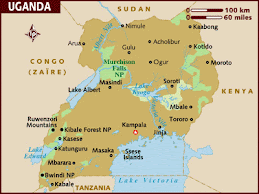
THE VIEW FROM DIRK'S VERANDAH
VSO held two workshops last week one for “leavers” and one for the health volunteers. This was a great opportunity to meet up and discuss the highs and lows of volunteering in Uganda. Pam and I gave a presentation about the Miirya project helped by Stephen and John from the community department. This was well received and the project is seen as an example of how VSO can contribute to grass roots development. It was good to have positive feedback from people you respect who understand the challenges of working here.
Looking back at the project I find it is the work that I am most proud of. I can think of several patients who have benefitted from my interventions but the lasting effect of the Miirya project is much more important. Even today I was approached by one of the staff at Court View who told me his uncle in the village had learnt about Tippy Taps and now he wants to be shown how to make one. That is really the point of working with volunteers in the villages they are so enthusiastic and their enthusiasm infects other people. We have now distributed nearly 5000 nets and for those families we have definitely reduced the incidence of malaria. There is still a demand for nets and with the funding we have attracted we can keep the project going for at least another 12 months. The next stage will be consolidation and more work on hygiene, immunization and nutrition.
After the conference we went to Jinja to stay with Dirk. He is a volunteer with another NGO Softpower. He has been here five years and has built a superb house overlooking the Nile at Jinja. Sitting on his verandah you can watch the brave souls being put through their paces in preparation for the white water rafting. Maggie was very envious of the plot, it would be hard to find a better view. We had a good time in Jinja watching the rafters and eating good food. On Saturday morning we went to have a look round Softpower. They have an education centre and a health clinic. The clinic lab is better resourced and organised than the lab at Masindi hospital. The education block has a library, computer rooms and a theatre and pottery. There is also a craft shop where they sell crafts made by volunteers and local people. Of course we bought some items from the shop. That is were the saga of the key began.
After lunch when Maggie came to pay she realised she had lost her purse with our money and credit cards. A short moment of panic later she remembered putting it on the shelf at the craft shop when she was paying. So all we had to do was track down the man with the key to get back in to the shop. Unfortunately he is the only one without a mobile. Luckily another staff member knew where he lived so we set off to his village. He was not there but someone thought he had stopped off to watch the Premier League. We did find someone with the key for the office so returned to Softpower to find that the key for the shop was not in the key box. So we had to find Safir. Two hours later after visiting every place with satellite TV, and hauling a colleague off the pitch in the middle of a game we gave up and returned to Dirk’s house. After twenty minutes Dirk had a phone call - Safir had been found. He had been at Softpower all afternoon, sitting making jewellery just behind the craft shop. Maggie never loses any thing, she is always organised and in control but Becky and I have enjoyed reminding her not to forget her purse.
GOING

GOING

GONE





